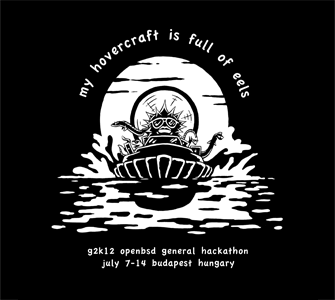Contributed by tbert on from the better-late-than-never dept.

Alexander Bluhm(bluhm@) notes his eclectic contributions:
On my first day at the g2k12 hackathon I commited a fix for races in the kernel socket splicing code. I had prepared the diff before, but getting OKs at a hackathon is quicker as all developers are around and working. In the regress tree I added a test that tries to trigger this race.
When analysing kernel core dumps with gdb, stack traces over i386 trap frames were not displayed correctly. So I fixed gdb to aid kernel debugging.
After adding UTF-8 support to OpenBSD, diff(1) only printed "Binary files differ" when comparing text files with Latin-1 characters in them. Together with stsp@ we changed diff to treat only files with NUL characters as binary. So diffing non-ascii text files works as expected again.
Then I made "af-to" rules in pf a bit easier to use. Before you had to specify "inet" in
pass in inet to 1.2.3.4 af-to inet6 from a:b:c:d::Now you can skip the first "inet" and writepass in to 1.2.3.4 af-to inet6 from a:b:c:d::as it can be derived from the "to 1.2.3.4" statement.To test all the forward and nat/rdr and nat64 cases in pf, I commited a little setup to the regress test suite, that sends packets through a machine with pf and checks the responses automatically. That way I can make sure that nothing breaks when improving pf further.
Finally I worked on rewriting the checksum calculation in pf. While henning@ is trying to get rid of it and wants to rely on hardware checksumming, I want to keep fixing the checksum in software in case the hardware is not capable of doing it. Unfortunately the current checksum fixing code cannot be easily turned on or off. So I am rearranging the algorithm to have a single point where we can decide wether to do it in software or in hardware. I have not finished this yet and it will come post OpenBSD 5.2.
Giovanni Bechis(giovanni@) had a truncated hackathon:
my hackathon was very short because I had to leave on tuesday morning, so I had not finished all the things I had in mind. I worked mostly on updating some ports (mail/amavisd-new, mail/p5-Fuzzy-Ocr, net/nmap, textproc/sphinx, comms/hylafax), on fixing a bug in graphics/gimp which has been committed post-g2k12, and on helping other hackers to import some new ports (sysutils/ranger, comms/picocom). My work on base was mostly related on importing pcap-filter(3) man page; I spent some time on it because we do not support all options in our pcap grammar as upstream does, so I had to test a lot of tcpdump filter expressions to be sure we would have a man page which reflects reality.
Miodrag Vallat(miod@) sneaks his way into our coverage:

Artist's rendition.
I did not attend the hackathon. Instead, I got a new obsolete machine, with a particular processor flavour supported by no free operating system so far, with the common knowledge that "it will never be supported by free OS projects". At the moment (and after a lot of work) it runs till the end of autoconf, I need to wire a scheduling clock to be able to see if I can get userland to run on it. Stay tuned, hopefully coming to a cvs tree near you. Now don't tell espie@, that would make him sad.
Marc Espie(espie@)'s experience illustrates how, when you peer into the libtool, the libtool peers also into you:
As for me, that's fairly simple, I spent most of the week trying to get our libtool to work better, mainly by cleaning up a lot of cruft that should NEVER have accumulated in the first place.
We now have a shiny new regression suite with LOADS of tests for it, much better parameter recognition that almost matches what gnu libtool does, and better understanding of some of the shit that gnu libtool tries to do!
Oh, and instead of insane code that will drive you crazy, it's now possible to read the code, understand it and add more new options to it...
Still more reports are in the pipeline; stay tuned while the editors bend time and space.
(Comments are closed)

By Will Backman (bitgeist) bitgeist@yahoo.com on http://bsdtalk.blogspot.com
Comments
By Marc Espie (espie) on
You want the "mikeb special report" ;)
Comments
By Gilles Chehade (gilles) on https://www.poolp.org/~gilles/
>
> You want the "mikeb special report" ;)
The "Sir Mikeb special report" !
Comments
By phessler (phessler) on http://theapt.org
> >
> > You want the "mikeb special report" ;)
>
> The "Sir Mikeb special report" !
Sir Mikeb the Brave!
Comments
By Miod Vallat (miod) on
No, that's Sir Robin.
Bravely bold Sir Robin rode forth from Camelot.
He was not afraid to die, O brave Sir Robin.
He was not at all afraid to be killed in nasty ways,
Brave, brave, brave, brave Sir Robin!
He was not in the least bit scared to be mashed into a pulp,
Or to have his eyes gouged out and his elbows broken,
To have his kneecaps split and his body burned away
And his limbs all hacked and mangled, brave Sir Robin!